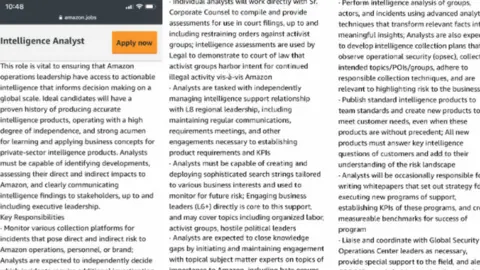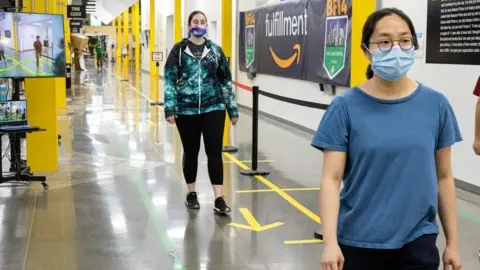Amazon withdraws job adverts for union 'spies'
 Getty Images
Getty ImagesAmazon has withdrawn two job adverts for "intelligence analysts" which said the posts would involve reporting on union activity among workers.
In a statement to the BBC, the US company said the wording "was not an accurate description of the role" and had since been corrected.
However, the BBC could not find new versions of the ads.
One management consultant said it seemed like a mistake and should never have been written.
The advert for an intelligence analyst based in Phoenix went live this week and read: "Analysts must be capable of engaging and informing... stakeholders on sensitive topics that are highly confidential, including labour organising threats against the company."
Among previous experience desired it listed "officer in the intelligence community, the military, law enforcement, or a related global security role in the private sector".
 Amazon
AmazonThere was a similar job listing for a senior intelligence analyst, which has also been removed.
Both pages now throw up an error message saying the content has disappeared.
Initially, Amazon indicated that it was standard practice for large businesses to employee people to carry out such activity.
But overnight the adverts were withdrawn. Amazon later said: "The job post was not an accurate description of the role - it was made in error and has since been corrected."
Marianne Rawlins, principal at management consultancy Bradley Risk Management, told the BBC: "The job description implies labour spying, and that has been illegal in the US for 80 years. I expect that sadly it is pretty common among big corporations, but putting it is black and white for all the world to see looks like a mistake."
Surveillance tech
Amazon has made it clear that it does not want its warehouse workers to join unions, saying that it prefers to talk directly to them about any concerns they may have.
The coronavirus pandemic has prompted some workers to establish their rights. One example has been to ask for clearer guidance about whether they can take more frequent toilet breaks to wash their hands, which can count as part of a productivity monitor known as as time off task (TOT).
Amazon said that it told workers in March that TOT would not include handwashing. But some workers claim they were not informed until July, when a court case about workers rights during the pandemic began.
 Amazon
AmazonA report from the Open Markets Institute suggested that the firm used "security cameras integrated with sophisticated artificial intelligence to monitor and track employee movements".
And it indicated that item scanners "also count of the number of seconds between each task assigned to the worker".
"When employees fall behind Amazon's chosen productivity rate, software in the scanners reprimands the employees who spend too much time off task, including issuing warnings and even terminating the employee."
In response to the OMI report, Amazon told the BBC: "Like most companies, we have performance expectations for every Amazonian - whether they're a corporate employee or fulfilment centre associate - and we measure actual performance against those expectations.
"Associate performance is measured and evaluated over a long period of time as we know that a variety of things could impact the ability to meet expectations in any given day or hour. We support people who are not performing to the levels expected with dedicated coaching to help them improve."
Vice has reported that internal reports suggest Amazon is also spying on closed Facebook groups to identify potential issues among workers.
Amazon fired two workers in April after they publicly denounced the company's treatment of warehouse workers during the pandemic. It said they had repeatedly violated internal policies, which prevent employees from commenting on its business without approval.
And in March, warehouse worker Christian Smalls - who had organised a protest over the safety precautions being taken by the firm - was sacked. A leaked memo from one of Amazon's lawyers later emerged suggesting Mr Smalls was "not smart, or articulate" and should consequently be made the face of the entire union movement.
